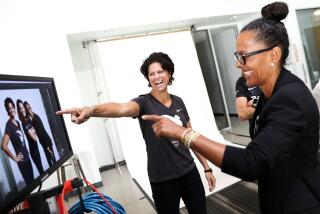L.A.’s Digital Heavyweights Lobby Against Sharing Cables
- Share via
The Digital Coast Roundtable, a group that represents influential new-media companies, has begun lobbying members of the Los Angeles City Council not to force cable operators and other providers of high-speed Internet access to open their lines to competitors.
For many of the companies represented by the Roundtable--whose members include Paramount Digital Entertainment, DreamWorks Interactive, USA Networks Interactive, EToys, Ticketmaster Online-CitySearch and Launch Media--widespread deployment of such Internet technologies is crucial.
Local governments in Portland, Ore., and elsewhere have voted to require cable operators to make their fat transmission pipes available to America Online and other Internet service providers. Their goal is to prevent monopolies that would keep prices for so-called broadband Internet access artificially high.
But cable companies argue that if they are forced to share their lines with competitors, they won’t be able to recoup the cost of upgrading their coaxial cables for broadband Internet transmissions, and that the roll-out of broadband access will slow. The Los Angeles council is expected to decide the issue in the next few months.
In a two-page position paper finalized this month, the Digital Coast Roundtable agrees with the cable industry’s rationale. The best thing for the region’s fledgling Internet companies is quick deployment of broadband technologies, and that is more likely to happen in the absence of government regulation, according to the Roundtable.
Cable companies face competition from phone companies and wireless operators even in the absence of government regulation. On the day that MediaOne announced it would offer broadband services to its cable subscribers, for instance, GTE countered by announcing its own high-speed digital subscriber line service, the position paper notes.
“The members of the Roundtable have a very significant interest in the roll-out of universal access to broadband services, and the success of their business models will be driven by the pace of that roll-out,” said Gary Mendoza, a partner with law firm Riordan & McKinzie and chairman of the Roundtable’s government relations committee. “The members don’t have a vested interest in who provides the broadband services.”
Now that its position paper is in hand, Roundtable representatives have begun meeting with City Council members and will probably talk to five or six of them altogether, Mendoza said. The Digital Coast Roundtable is also reaching out to other new-media groups such as the Venice Interactive Community that are likely to have the same position, he said.
More to Read
Sign up for Essential California
The most important California stories and recommendations in your inbox every morning.
You may occasionally receive promotional content from the Los Angeles Times.











